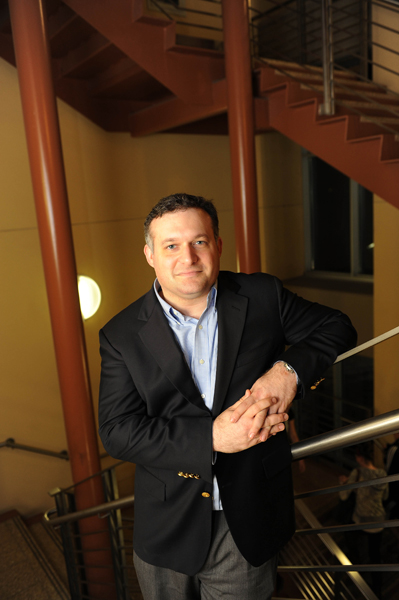When Ralph Maurer became interim executive director of the Levy-Rosenblum Institute for Entrepreneurship in July, his first task was to evaluate the Freeman School’s entrepreneurship curriculum, which hadn’t been updated in several years, and develop a plan to improve it. According to Maurer, the program’s biggest need was easy to identify.

Ralph Maurer, professor of practice and executive director of the Tulane Family Business Center, was appointed interim executive director of the Levy-Rosenblum Institute for Entrepreneurship in July, succeeding his friend and colleague John Elstrott.
“Our strongest offerings have tended to be extracurricular,” says Maurer, a professor of practice who’s taught entrepreneuship-related classes at the Freeman School since 2009. “The Levy-Rosenblum Institute coordinates the Tulane Entrepreneurs Association, the Freeman Consulting Group and the Tulane Business Plan Competition and those have gone wonderfully, but what I discovered is there’s a demand among students for greater mentorship and greater structure. And that can only happen in the classroom.”
In January, Maurer proposed an ambitious new entrepreneurship curriculum designed to enhance the program’s classroom component while providing greater integration and supervision for extracurricular experiential learning projects. The new curriculum, called the Freeman Ventures Program, will augment the current MBA entrepreneurship specialization by providing more intensive instruction in three distinct focus areas of entrepreneurship.
“When students say they’re interested in entrepreneurship, they’re usually interested in one of three things,” Maurer explains. “They’re interested in founding a company, they’re interested in working for an early-stage company, or they’re interested in investing. And those are three very different activities in the real world.”
To better reflect the real-world aspirations of students, the Freeman Ventures Program will feature three different tracks: Early-Stage Venture Creation, Second-Stage Growth and Venture Finance. Each track will consist of a two-course module delivered over the course of one academic year, and each track will be paired with a supervised and mentored extracurricular project that enables students to put what they’re learning in the classroom to work on real startup or early-stage companies.
Students in the Early-Stage Venture Creation track, for example, will work with startup companies affiliated with a new cross-campus venture accelerator. Students in the Second-Stage Growth track will work on consulting projects for small businesses under the director of Adjunct Professor Sherif Ebrahim, who worked closely with Maurer on the design of the program. For the Venture Finance track, Maurer hopes to raise funds to create a student-managed venture capital fund that participants will be able to invest in real startup companies.
“The program requires more time and commitment than our current entrepreneurship specialization, but the student is going to come out of it with a certificate and real-world experience with an early-stage venture to show potential employers,” Maurer says. “I think it’s ultimately going to help more students find jobs.”
While the curriculum still needs to be approved by the faculty, Maurer says he hopes to begin offering two of the tracks—Early Stage Venture Creation and Second-Stage Growth—in fall 2013. The Venture Finance track will begin as soon as funds are raised for the student-managed venture capital fund. The Freeman Ventures Program will initially be offered only to MBAs, but Maurer says he hopes to expand the curriculum to the undergraduate program in the near future.
In recent years, New Orleans has gained a national reputation for its flourishing startup scene. From the Idea Village to the New Orleans BioInnovation Center to Propeller, the city’s entrepreneurial community boasts a variety of organizations that seek to provide assistance to entrepreneurs, a situation that has led to some confusion on the part of alumni as to what the Freeman School’s role in this dynamic, high-visibility space should be. The Freeman Ventures Program, Maurer says, will go a long way toward clarifying that role.
“Our job as a university is not to start businesses or help businesses directly,” he says. “Our job is to train world-class talent. We provide the feedstock for a lot of the great entrepreneurial ventures being created in New Orleans, and in that sense, I think this program will help us become an even more prominent part of the city’s growing entrepreneurial ecosystem.”
